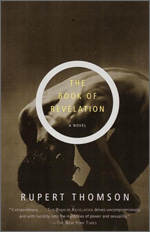| Music | Literature | Film | Index | About |

|
The Book of Revelation, Rupert Thomson Alfred A. Knopf, February 9, 2000
These are the words I uttered, while approaching two strangers in a Los Angeles bookstore in early 2000. I was on a mission to get the message out, so I literally walked right up to unsuspecting browsers and pushed the novel like a drug dealer selling heroine to a street junkie. The bold move—a first and only of its kind—paid off. Both people purchased the novel, but my duty was hardly done. “I would like to nominate Rupert Thomson’s The Book of Revelation for our next meeting. It’s about a male dancer in his late twenties, living in Amsterdam, who is abducted by three hooded women on his way to the market to buy cigarettes for his French girlfriend and dancing partner. The mysterious trio holds the unnamed man as a sex slave for eighteen days in a remote location of the city, and the abuse has repercussions that echo through the rest of his crippled life as a performer.” That is how I pitched the selection to my book club, another eleven eager readers. Maybe sexual intrigue or my assertion that the story’s nuances elevated the material beyond a seemingly tawdry premise hooked them. I hinted at the thematic shifting of first person to third person narrative and that an incisive psychological exploration of captivity, along with the painful aftermath of imprisonment, would surely keep us engaged in lively conversation. Whatever the final reasoning, the group unanimously voted in favor of the provocative choice, and our discussion about the piece of fiction was more spirited than expected. Torture is rarely a dull topic, and my tally of recruits hit a major uptick. I was on a roll. “Take this with you on your trip. You’ll be hooked from the time the plane’s wheels go up until touchdown. I promise you.” These words were spoken to a friend, as I handed her my copy of the book. She later thanked me for the fastest cross-country flight of her life. She also bought a second novel by Thomson for the return trip and loaned that earlier work to me in a generous act of reciprocation. I was encouraged by her reaction to keep the course of my plight, even if it meant doing so one reader at a time. A new author had captured my imagination, and I was not going to be imprisoned alone by his devious mind. Everywhere I looked there was someone I could kidnap on my unsanctioned publicity spree. I had no vested interest other than the satisfaction of knowing others might finish the book with the same excitement and sense of discovery that dominated my agile limbs. From the moment I set the completed book down, my behavior bordered on obsession, which is why when the author visited the city for a book signing, I stalked my captor and relished standing in a room with other devotees. My turn came to approach the table where Thomson sat could not come soon enough. I told the author about my extracurricular activities. Surely, there was a risk of him thinking I had gone mad … that I was some freakish fan better suited for a straightjacket than flat-front khakis and a Polo shirt. . . . Call security! … But he laughed, smiling a grateful mischievous grin that could only be worn by a person capable of writing a devilish tale spawning such possession. I was no threat, and he signed my book: No. I am in your debt, Mr. Thomson. And if you read this, then know I am out there, still shilling on your behalf. I am also wondering what the illegible sentence says that you wrote on my hardback's title page. It is one of many phrases from your audacious mind that seize me to this day. Thank you. “Go to Amazon.com, and order a copy of a sneaky novel that has the power to initiate talk amongst strangers, titillate a book club or turn a regular guy into an endless promoter of its sublime achievement.” These are the words I leave for you, dear reader, on the Internet, about a novel that had a very peculiar effect. You can bet you have not heard the last of me yet. The true campaign has only begun. . . .
|
 |
||||||